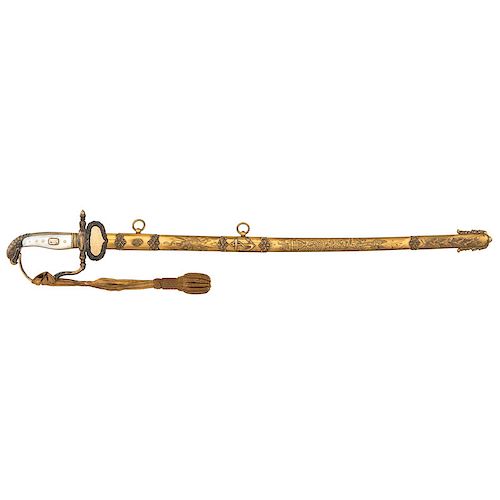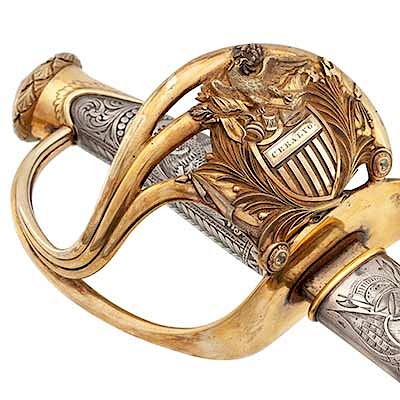Ames Naval Officer's Sword Presented to Lt. James Lawrence Parker of the USN by the City of Philadelphia
About Seller
6270 Este Ave.
Cincinnati , OH 45232
United States
With offices in Cincinnati, Cleveland and Denver, Cowan’s holds over 40 auctions each year, with annual sales exceeding $16M. We reach buyers around the globe, and take pride in our reputation for integrity, customer service and great results. A full-service house, Cowan’s Auctions specializes in Am...Read more
Two ways to bid:
- Leave a max absentee bid and the platform will bid on your behalf up to your maximum bid during the live auction.
- Bid live during the auction and your bids will be submitted real-time to the auctioneer.
Bid Increments
| Price | Bid Increment |
|---|---|
| $0 | $25 |
| $500 | $50 |
| $1,000 | $100 |
| $2,000 | $250 |
| $5,000 | $500 |
| $10,000 | $1,000 |
| $20,000 | $2,500 |
| $50,000 | $5,000 |
| $100,000 | $10,000 |
About Auction
Oct 30, 2018
Cowan's is honored to present the Magnificent Sword Collection of William Koch in its two-day firearms, militaria, and American history auction, with a focus on the Civil War. Cowan's Auctions dawnie@cowans.com
- Lot Description
Ames Naval Officer's Sword Presented to Lt. James Lawrence Parker of the USN by the City of Philadelphia
27.75" slightly curved, single-edged, semi-quill-backed blade. 5.75" eagle head hilt with folding guard and counter-guard. Blade deeply etched with flowing foliate scrolls, panoplies of arms, martial, nautical and American themes including the American eagle. The obverse of the blade is etched with the Latin motto: confide recite agent (doing rightly be confident) with the reverse etched: Thou God seest me . The reverse is also etched NP Ames / Cutler / Springfield at the ricasso. The hilt features acorn finials at the upper and lower quillons. The grip is mother-of-pearl, set with a foil backed modified emerald cut piece of quartz measuring approximately 16mm x 10mm. The two small stones in the eyes of the eagle head test as garnets. The obverse counter guard is surrounded with a laurel wreath and is inscribed: Presented by / the Citizens of PHILADELPHIA to Lieut James Lawrence Parker U.S.N. for his heroic conduct in Boarding and destroying the MEXICAN BRIG CREOLE on the night of the 21 of Nov. 1846 while that vessel was moored to the castle of San Juan D'ULLOA . The reverse counter-guard is unadorned. The gilt brass scabbard is engraved with floral, nautical and martial motifs with two suspension rings and a frog stud with a fouled anchor motif. A gold sword knot accompanies the sword.
A native of New Hampshire, James Lawrence Parker had joined the navy as midshipman in June 1831 and was promoted to lieutenant in in September 1841. With the advent of the Mexican War, Lieutenant Parker was serving as executive officer of the brig Somers , a ship vexed by the stigma of mutiny. The ill-fated Somers was captained by future Confederate luminary Raphael Semmes and Lieutenant Parker is mentioned in a familiar tone in "Service Afloat and Ashore During the Mexican War" published by Semmes in 1851. While Semmes did not participate in the daring foray, his report reflects approvingly, "...Lieutenant Parker, accompanied by Passed Midshipman Rodgers and Hynson, with five seamen, performed the clever exploit of burning the Mexican Merchant brig Creole, under the wall of San Juan de Ulloa. They pulled in, under the cover of night, and boarding the vessel without opposition, fired her in several places, and departed unmolested; although within pistol range of the castle. Some little noise having been made aboard the brig, when they were in the act of boarding, they were hailed by one of the sentinels; Lieutenant Parker speaking the language like a native, gave some satisfactory reply, and they were not further noticed." A few weeks later, on December 8, 1846, the unlucky Somers capsized in a sudden gale "while endeavoring to cut off a vessel, which was apparently intending to run the blockade." The brig went down quickly with the loss of 39 crewmen drowned. Semmes' official report to Secretary of the Navy John Y. Mason specifically mentioned the composure of Lieutenant Parker as he oversaw one of the doomed ship's boats being filled with men who could not swim. Parker managed to survive the violent ordeal, was advanced to flag lieutenant and assigned as aide to Commodore Matthew Perry, recently promoted to command of the Home Squadron. The intrepid small boat action at San Juan de Ulloa occurred during the joint army-navy investment of Vera Cruz and was widely reported along the eastern seaboard by the popular press. The January 12, 1847 edition of the Richmond Whig and Advertiser proclaimed, "The citizens of Philadelphia have determined to present Lieut. James Lawrence Parker a handsome Naval Sword, a pair of Epaulettes and a full suit Uniform, for his daring exploit in burning the Mexican Brig Creole, while moored to the Castle of San Juan de Ulloa, and for his noble conduct in refusing to leave the unfortunate brig Somers, until she had sunk into the depths of the ocean." The whereabouts' of Parker's epaulettes and uniform are unknown, if they survive, as only the sword was found. Similarly, on January 14, 1847 the South Carolina Patriot reported details of the "gallant exploit" and the presentation of a "splendid sword." As well, several of the Manifest Destiny charged populist histories published shortly after the end of the war mention Lieutenant Parker, one of the few bona fide naval heroes to emerge from the conflict. Hutchinson's composite Illustrated American History appeared in 1849 and described the deed in plain terms, as "very daring and brave" (p.51), while John Frost's substantive The Mexican War and its Warriors characterized the act as "one of the most daring achievements of the war." (p.214). In April 1847 the recently elevated Commodore Perry planned to capture the fortified town of Tuxpan, the last remai9ning Mexican bastion on the Gulf coast. Perry's combined naval and marine flotilla - the Mosquito Fleet - consisting of five warships with barges of sailors and marines in tow ascended the Tuxpan River on April 18, 18547 and quickly stormed the town complex routing the 650 man Mexican garrison commanded by General Martin de Cos, a veteran of the Alamo and brother-in-law of Santa Anna. Lieutenant Parker, serving as aide to Commodore Perry, was one of fourteen American casualties, reported as "wounded" in Perry's official report. The extent of Parker's injury is unknown, however the heroic officer died in hospital at Vera Cruz on July 12, 1847. Parker likely had accompanied Perry on his June expedition against Tabasco and died after contracting yellow fever "that struck many sailors and marines." News of Lieutenant Parker's death was widely circulate. The first report appeared in the Philadelphia Enquirer on August 2, 1847 via a New Orleans Times correspondent, followed later in the week by a second story in the hometown New Hampshire Patriot . The August 10, 1847 edition of the New Hampshire Gazette reported Lieutenant Parker "recently deceased of fever at Vera Cruz." The August 17, 1847 Richmond Enquirer carried Perry's own somber report verbatim, "with sincere regret that I announce to the department the death, last evening, at a minute past 11 o' clock, of Lieutenant James L. Parker, my aide and Flag Lieutenant. Mr. Parker has been with me on all my latest expeditions..." It is unknown what became of remains of the celebrated national hero. Decorations for heroism had not yet come into use in the American military at the time of the Mexican War. This rare heirloom sword given to a regular officer in recognition of gallant service was in lieu of any official navy or government award reflecting the norm of the 19th century. The paper "Certificate of Merit" was authorized only in 1847 for enlisted men while the Medal of Honor (navy version) was not instituted until 1861. Typically, brevet rank was awarded to army officers while reserved for a handful of extraordinary individuals was the "Joint Resolution of Congress" - the most esteemed form of recognition - conveyed to the nation's highest ranking recipients. One Hundred seventy one years ago Lieutenant James Lawrence Parker burst on to the national scene for a fleeting moment, his daring exploits at Vera Cruz enshrined for posterity by a pair of incredible companion presentation swords reflecting the appreciation of the citizenry of Philadelphia and Pittsburgh.
Very good. Blade with a slightly dulled, aged steel appearance, showing some scattered light surface oxidation, minor staining and some scattered pinpricking and light pitting. Etching clear, with some very light wear. Hilt very good with the backstrap slightly proud of the grip. Scabbard fine.Condition
- Shipping Info
-
Buyers are required to pay for all packing, shipping and insurance charges. Overseas duty charges are the responsibility of the successful Bidder. Be aware that for larger and/or valuable items, shipping charges can be substantial. - If there is no shipping amount on listed your invoice, you will need to make arrangements to pick up or ship your purchase through an alternative shipping company. Our shipping department can be contacted at 513.871.1670 (ext. 219) or email shipping@cowans.com. - Shipping charges include insurance for your order while in transit. If you have private insurance we will adjust your charge to include only packing and shipping. - Please allow 14 – 21 days after payment to package and ship your purchase as carefully as possible.
-
- Buyer's Premium



 EUR
EUR CAD
CAD AUD
AUD GBP
GBP MXN
MXN HKD
HKD CNY
CNY MYR
MYR SEK
SEK SGD
SGD CHF
CHF THB
THB























